时态综合练习题
- 格式:docx
- 大小:13.13 KB
- 文档页数:1
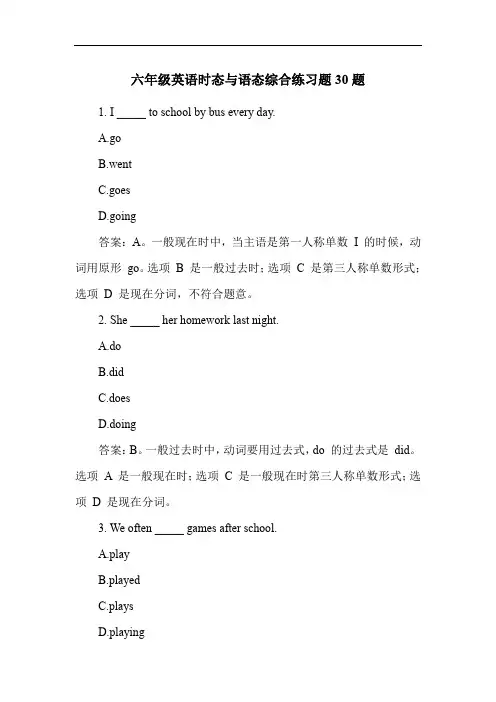
六年级英语时态与语态综合练习题30题1. I _____ to school by bus every day.A.goB.wentC.goesD.going答案:A。
一般现在时中,当主语是第一人称单数I 的时候,动词用原形go。
选项B 是一般过去时;选项C 是第三人称单数形式;选项D 是现在分词,不符合题意。
2. She _____ her homework last night.A.doB.didC.doesD.doing答案:B。
一般过去时中,动词要用过去式,do 的过去式是did。
选项 A 是一般现在时;选项C 是一般现在时第三人称单数形式;选项D 是现在分词。
3. We often _____ games after school.A.playB.playedC.playsD.playing答案:A。
一般现在时,主语是we,动词用原形play。
选项B 是一般过去时;选项C 是第三人称单数形式;选项D 是现在分词。
4. He _____ to the park yesterday.A.goB.wentC.goesD.going答案:B。
一般过去时,yesterday 是明显的过去时间标志,动词要用过去式went。
选项 A 是一般现在时;选项C 是一般现在时第三人称单数形式;选项D 是现在分词。
5. They _____ English every morning.A.studyB.studiedC.studiesD.studying答案:A。
一般现在时,主语是they,动词用原形study。
选项B 是一般过去时;选项C 是第三人称单数形式;选项D 是现在分词。
6. I _____ a book yesterday.A.readB.readedC.reads答案:A。
read 的过去式还是read。
选项B 错误;选项C 是一般现在时第三人称单数形式;选项D 是现在分词。
7. She _____ to music now.A.listenB.listenedC.listensD.is listening答案:D。
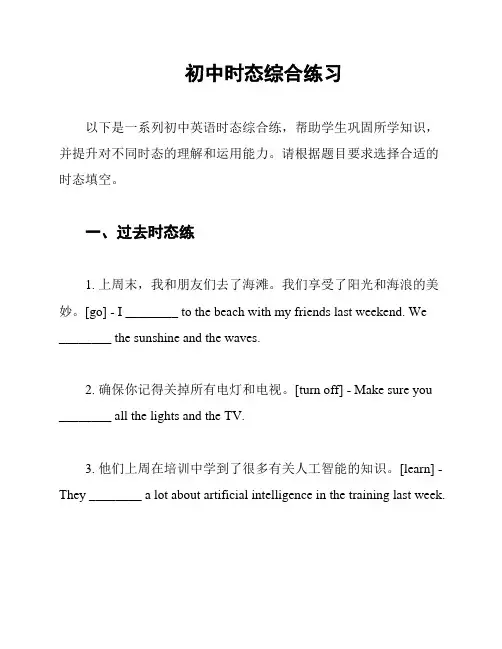
初中时态综合练习以下是一系列初中英语时态综合练,帮助学生巩固所学知识,并提升对不同时态的理解和运用能力。
请根据题目要求选择合适的时态填空。
一、过去时态练1. 上周末,我和朋友们去了海滩。
我们享受了阳光和海浪的美妙。
[go] - I ________ to the beach with my friends last weekend. We________ the sunshine and the waves.2. 确保你记得关掉所有电灯和电视。
[turn off] - Make sure you ________ all the lights and the TV.3. 他们上周在培训中学到了很多有关人工智能的知识。
[learn] - They ________ a lot about artificial intelligence in the training last week.4. 我小时候住在一个美丽的小村庄,那里的风景非常迷人。
[live] - I ________ in a beautiful village when I was young. The scenery there ________ very charming.5. 你上个月去过中国吗?[visit] - ________ you ________ to China last month?6. 他在昨晚的比赛中打破了纪录。
[break] - He ________ the record in last night's game.7. 这个简单的小餐馆不再存在了。
[exist] - This simple little restaurant ________ no longer.8. 你昨天跟朋友们玩得开心吗?[have] - ________ you________ fun with your friends yesterday?9. 在我小的时候,我总是很害羞。
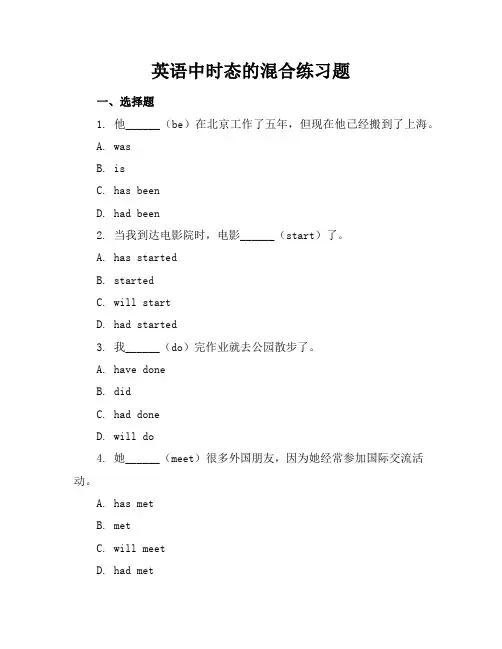
英语中时态的混合练习题一、选择题1. 他______(be)在北京工作了五年,但现在他已经搬到了上海。
A. wasB. isC. has beenD. had been2. 当我到达电影院时,电影______(start)了。
A. has startedB. startedC. will startD. had started3. 我______(do)完作业就去公园散步了。
A. have doneB. didC. had doneD. will do4. 她______(meet)很多外国朋友,因为她经常参加国际交流活动。
A. has metB. metC. will meetD. had met二、填空题1. 昨天下午,他______(read)一本书,直到晚上才看完。
2. 到目前为止,我已经______(visit)过我国的三十五个省份。
3. 当我小时候,我______(play)足球,但现在我喜欢打篮球。
4. 他们______(travel)到世界各地,积累了丰富的旅行经验。
5. 明年这个时候,他______(graduate)并找到一份好工作。
三、改写句子1. He has lived in New York for three years.(改为过去完成时)______ he ______ in New York for three years before he moved to Los Angeles.2. They will have finished the task the end of this week.(改为一般现在时)______ finish the task the end of this week.3. I was doing my homework when my friend called me.(改为一般过去时)My friend ______ me when I ______ my homework.4. She has studied English for five years.(改为过去进行时)She ______ English when I met her last year.5. We will celebrate our anniversary next month.(改为将来完成时)By next month, we ______ our anniversary.四、匹配题请将下列句子与正确的时态匹配:A. Present ContinuousB. Past SimpleC. Present PerfectD. Future SimpleE. Past Perfect1. I am eating dinner right now.2. He went to the store yesterday.3. They have visited the museum three times this year.4. She will start a new job next week.5. They had finished the work before the meeting started.五、完成句子1. If it ______ (rain) tomorrow, we will cancel the picnic.2. By the time you read this letter, I ______ (leave) for London.3. While she ______ (cook) dinner, someone knocked on the door.4. They ______ (not finish) the report yet, but they will soon.六、综合运用题Combine the following sentences using the correct tense and connectives:1. He was very tired. He had worked all day.________________________.2. She has lived in this city for a long time. She knows every corner of it.________________________.3. They will go to the party. They will meet many friends there.________________________.4. You can't go out. You haven't finished your homework.________________________.5. He didn't attend the meeting. He had already left the office.________________________.七、阅读理解题Read the following passage and answer the questions inthe correct tense:John has always been interested in photography. He bought his first camera when he was fifteen years old. Since then,he has taken thousands of pictures. Last year, he decided to turn his hob into a profession. He is currently studying at a photography school and hopes to open his own studio next year. He believes that photography is an art that captures moments and emotions.1. How long has John been interested in photography?________________________.2. When did John buy his first camera?________________________.3. What is John doing right now?________________________.4. What does John plan to do after he finishes his studies?________________________.5. What is John's opinion about photography?________________________.答案一、选择题1. C. has been2. B. started3. A. have done4. A. has met二、填空题1. was reading2. visited3. played4. have travelled5. will have graduated三、改写句子1. He had lived in New York for three years before he moved to Los Angeles.2. They finish the task the end of this week.3. My friend called me when I was doing my homework.4. She was studying English when I met her last year.5. By next month, we will have celebrated our anniversary.四、匹配题1. A. Present Continuous2. B. Past Simple3. C. Present Perfect4. D. Future Simple5. E. Past Perfect五、完成句子1. If it rains tomorrow, we will cancel the picnic.2. By the time you read this letter, I will have left for London.3. While she was cooking dinner, someone knocked on the door.4. They have not finished the report yet, but they will soon.六、综合运用题1. He was very tired because he had worked all day.2. She has lived in this city for a long time, so she knows every corner of it.3. They will go to the party, where they will meet many friends.4. You can't go out because you haven't finished your homework.5. He didn't attend the meeting because he had already left the office.七、阅读理解题1. John has been interested in photography for a long time.2. John bought his first camera when he was fifteen years old.3. John is currently studying at a photography school.4. John plans to open his own studio after he finishes his studies.5. John believes that photography is an art that captures moments and emotions.。
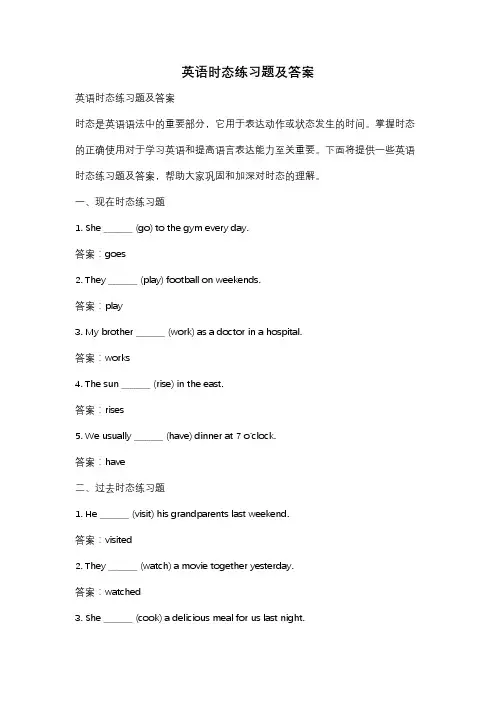
英语时态练习题及答案英语时态练习题及答案时态是英语语法中的重要部分,它用于表达动作或状态发生的时间。
掌握时态的正确使用对于学习英语和提高语言表达能力至关重要。
下面将提供一些英语时态练习题及答案,帮助大家巩固和加深对时态的理解。
一、现在时态练习题1. She _______ (go) to the gym every day.答案:goes2. They _______ (play) football on weekends.答案:play3. My brother _______ (work) as a doctor in a hospital.答案:works4. The sun _______ (rise) in the east.答案:rises5. We usually _______ (have) dinner at 7 o'clock.答案:have二、过去时态练习题1. He _______ (visit) his grandparents last weekend.答案:visited2. They _______ (watch) a movie together yesterday.答案:watched3. She _______ (cook) a delicious meal for us last night.4. We _______ (live) in London for three years before moving to Paris. 答案:lived5. The teacher _______ (give) us a lot of homework yesterday.答案:gave三、将来时态练习题1. I _______ (meet) my friends for lunch tomorrow.答案:will meet2. They _______ (travel) to Japan next month.答案:will travel3. She _______ (start) a new job next week.答案:will start4. We _______ (have) a party on Saturday.答案:will have5. He _______ (buy) a new car in the near future.答案:will buy四、现在进行时练习题1. They _______ (study) in the library at the moment.答案:are studying2. I _______ (watch) a movie right now.答案:am watching3. She _______ (read) a book at the café.4. We _______ (have) dinner with our friends tonight. 答案:are having5. He _______ (play) the guitar in his room.答案:is playing五、过去进行时练习题1. They _______ (study) for the exam all night.答案:were studying2. She _______ (cook) dinner when I arrived home.答案:was cooking3. We _______ (watch) a movie at the cinema last night. 答案:were watching4. He _______ (read) a book while waiting for the train. 答案:was reading5. I _______ (work) on a project at the office yesterday. 答案:was working六、现在完成时练习题1. I _______ (visit) Paris twice.答案:have visited2. They _______ (finish) their homework already.答案:have finished3. She _______ (read) that book before.4. We _______ (not see) each other for a long time.答案:have not seen5. He _______ (travel) to many countries in the past.答案:has traveled通过以上练习题,我们可以加深对英语时态的理解和掌握。
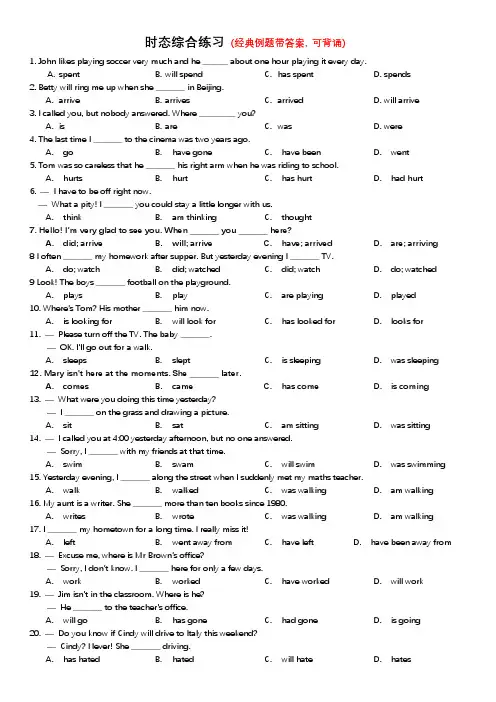
时态综合练习(经典例题带答案, 可背诵)1. John likes playing soccer very much and he _______ about one hour playing it every day.A.spentB.will spendC.has spentD.spends2. Betty will ring me up when she ________ in Beijing.A.arriveB.arrivesC.arrivedD.will arrive3. I called you, but nobody answered. Where __________ you?A.isB.areC.wasD.were4. The last time I ________ to the cinema was two years ago.A.goB.have goneC.have beenD.went5. Tom was so careless that he ________ his right arm when he was riding to school.A.hurtsB.hurtC.has hurtD.had hurt6. —I have to be off right now.—What a pity! I ________ you could stay a little longer with us.A.thinkB.am thinkingC.thought7. Hello! I’m very glad to see you. When ________ you ________ here?A.did; arriveB.will; arriveC.have; arrivedD.are; arriving8 I often ________ my homework after supper. But yesterday evening I ________ TV.A.do; watchB.did; watchedC.did; watchD.do; watched9 Look! The boys ________ football on the playground.A.playsB.playC.are playingD.played10. Where’s Tom? His mother ________ him now.A.is looking forB.will look forC.has looked forD.looks for11. —Please turn off the TV. The baby ________.—OK. I’ll go out for a walk.A.sleepsB.sleptC.is sleepingD.was sleeping12. Mary isn’t here at the moments. She ________ later.esB.cameC.has comeD.is coming13. —What were you doing this time yesterday?—I ________ on the grass and drawing a picture.A.sitB.satC.am sittingD.was sitting14. —I called you at 4:00 yesterday afternoon, but no one answered.—Sorry, I ________ with my friends at that time.A.swimB.swamC.will swimD.was swimming15. Yesterday evening, I ________ along the street when I suddenly met my maths teacher.A.walkB.walkedC.was walkingD.am walking16. My aunt is a writer. She ________ more than ten books since 1980.A.writesB.wroteC.was walkingD.am walking17. I ________ my hometown for a long time. I really miss it!A.leftB.went away fromC.have leftD.have been away from18. —Excuse me, where is Mr Brown’s office?—Sorry, I don’t know. I ________ here for only a few days.A.workB.workedC.have workedD.will work19. —Jim isn’t in the classroom. Where is he?—He ________ to the teacher’s office.A.will goB.has goneC.had goneD.is going20. —Do you know if Cindy will drive to Italy this weekend?—Cindy? Never! She ________ driving.A.has hatedB.hatedC.will hateD.hates21. If you ________ to the 2010 Shanghai Expo next month, I will go with you.A.goB.has goneC.will goD.are going22. Last Sunday my aunt ________ at home with me. We were watching TV all day.A.wasB.wereC.isD.are23. —What do you think of the film “Avatar”?—It’s fantastic. The only pity is that I ________ the beginning of it.A.missedB.was missingC.missD.will miss24. —I hear Sam has gone to Qingdao for his holiday. —Oh, how nice! Do you know when he ______ ?A.leftB.was leavingC.has leftD.had left25. —Did you sleep well last night? —Far from that! One of my neighbors ________ music pretty loud.A.playsB.is playingC.was playingD.would play26. —Why didn’t you go to the cinema with us this afternoon?—I ________ at the station for my uncle from Beijing.A.was waitingB.have waitedC.am waitingD.will wait27. Today is Father’s Day. My mother ________ a special dinner for my grandpa now.A.prepareB.preparedC.is preparingD.will prepare28. —Hello, Sandy. This is Jack. What are you doing?—I’m watching a match. It started at 7 p.m. and ________ on for another half an hour.A.has beenB.wasC.had beenD.will be29. My brother left school in 2005, and since then he ________ in Beijing.A.livesB.livedC.will liveD.has lived30. There are many people downstairs. What do you think ________?A.to happenB.happeningC.is happenedD.has happened31. —Have you even been to Shanghai, Mary? —Yes. I ____ there for three days with my parents last month.A.have goneB.have beenC.wentD.was32. —Where is Zhang Ming?—Oh, don’t you know he ________ to Beijing to see his parents and he’ll be back tomorrow.A.has goneB.has beenC.had goneD.went33. Although this village isn’t big, all the other villages I ________ so far are smaller.A.visitedB.have visitedC.would visitD.had visited34. The plane ________ when we got to the airport.A.had taken offB.was taken offC.will take offD.is taking off35. I used to love this film when I was young, but I ________ it that way anymore.A.don’t feelB.didn’t feelC.haven’t feltD.hadn’t felt36. —Have you read a book called Jane Eyre? —Who ________ it?A.writesB.had writtenC.was writingD.wrote37. The zoo keepers are worried because the number of visitors ________ smaller and smaller.A.becomeB.becameC.is becomingD.have become38. It ________ outside. You’d better take an umbrella with you.A.rainsB.is rainingC.rainedD.has rained39. I first met Lisa three years ago when we ________ at a radio station together.A.have workedB.had been workingC.were workingD.had worked40. —Why are you in such a hurry, Mike? —There ________ an NBA basketball game in ten minutes.A.will haveB.will beC.is going to haveD.are going to be答案详解。
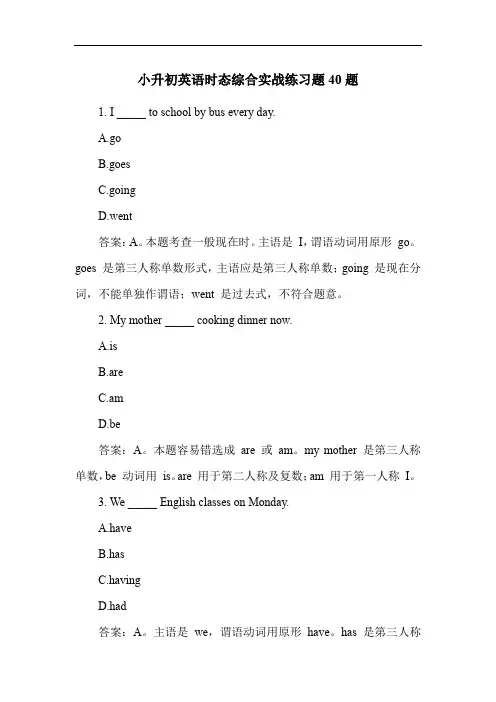
小升初英语时态综合实战练习题40题1. I _____ to school by bus every day.A.goB.goesC.goingD.went答案:A。
本题考查一般现在时。
主语是I,谓语动词用原形go。
goes 是第三人称单数形式,主语应是第三人称单数;going 是现在分词,不能单独作谓语;went 是过去式,不符合题意。
2. My mother _____ cooking dinner now.A.isB.areC.amD.be答案:A。
本题容易错选成are 或am。
my mother 是第三人称单数,be 动词用is。
are 用于第二人称及复数;am 用于第一人称I。
3. We _____ English classes on Monday.A.haveB.hasC.havingD.had答案:A。
主语是we,谓语动词用原形have。
has 是第三人称单数形式;having 是现在分词,不能单独作谓语;had 是过去式,不符合一般现在时。
4. Tom _____ playing football after school.A.likeB.likesC.likingD.liked答案:B。
Tom 是第三人称单数,谓语动词用likes。
like 是原形,主语应是非第三人称单数;liking 是现在分词,不能单独作谓语;liked 是过去式。
5. My sister _____ reading books in her free time.A.likeB.likesC.likingD.liked答案:B。
my sister 是第三人称单数,谓语动词用likes。
like 是原形,主语应是非第三人称单数;liking 是现在分词,不能单独作谓语;liked 是过去式。
6. They _____ to the park on weekends.A.goB.goesC.going答案:A。
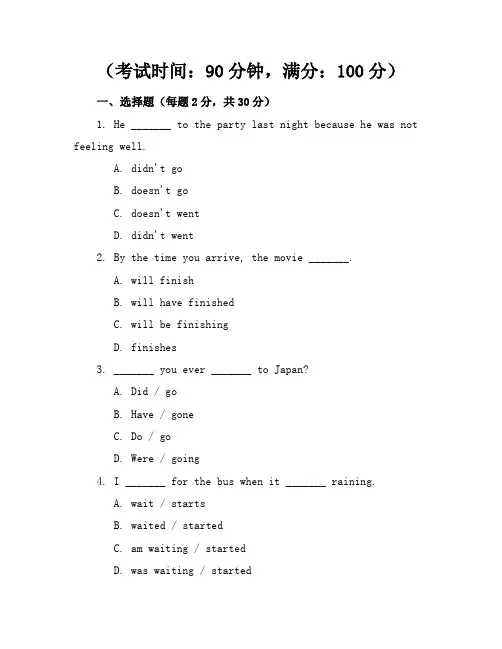
(考试时间:90分钟,满分:100分)一、选择题(每题2分,共30分)1. He _______ to the party last night because he was not feeling well.A. didn't goB. doesn't goC. doesn't wentD. didn't went2. By the time you arrive, the movie _______.A. will finishB. will have finishedC. will be finishingD. finishes3. _______ you ever _______ to Japan?A. Did / goB. Have / goneC. Do / goD. Were / going4. I _______ for the bus when it _______ raining.A. wait / startsB. waited / startedC. am waiting / startedD. was waiting / started5. _______ you like some more coffee?A. CouldB. WouldC. ShouldD. Might6. She _______ her homework when her friend _______.A. was doing / calledB. did / has calledC. does / callsD. is doing / calls7. _______ you _______ the book yet?A. Did / readB. Have / readC. Do / readD. Are / reading8. They _______ in the park when it _______.A. play / is rainingB. played / rainedC. are playing / rainsD. were playing / started to rain9. I _______ her for two years before we got married.A. knowB. knewC. have knownD. had known10. _______ you like _______ to the concert with me?A. Do / to goB. Would / goingC. Are / goingD. Will / go二、判断题(每题1分,共20分)1. The past perfect tense is used to describe an action that happened before another past action. (True/False)2. The simple present tense can be used to talk about scheduled future events. (True/False)3. The present perfect continuous tense is used to describe an action that started in the past and is still continuing in the present. (True/False)4. The past continuous tense is used to describe an action that was happening at a specific time in the past. (True/False)6. The simple past tense is used to describe an action that happened and is now finished. (True/False)7. The present continuous tense is used to describe an action that is happening now. (True/False)8. The past perfect continuous tense is used to describe an action that was ongoing before another past action. (True/False)9. The future simple tense is used to talk about spontaneous future decisions. (True/False)10. The present perfect tense is used to describe an action that happened at an unspecified time before now. (True/False)三、填空题(每空1分,共10分)1. I _______ (to eat) dinner when the phone _______ (to ring).2. By next week, she _______ (to finish) her project.3. They _______ (to travel) to London last summer.4. _______ you _______ (to see) the new movie yet?5. He _______ (to study) English for five years.四、简答题(每题10分,共10分)1. Explain the difference between the simple past and the past continuous tense.2. When do we use the present perfect tense?五、综合题(1和2两题7分,3和4两题8分,共30分)1. Read the following conversation and fill in the blanks with the correct form of the verb in brackets.A: _______ you _______ (to see) Tom recently?B: Yes, I _______ (to see) him last week. He _______ (to tell) me about his new job.2. Complete the following sentences using the correct form of the verb in brackets.1. I _______ (to go) to the gym after work.2. She _______ (to have) a meeting at 10 am tomorrow.3. They _______ (to travel) to Paris next month.3. Write a short paragraph (about 5070 words) using at least three different tenses. Topic: "My Typical Day"4. Read the passage and answer the questions.Yesterday, Sarah and her8. 改错题(每题2分,共10分)1. I has finished my homework.2. She didn't went to the party.3. He was watching TV when I called him.4. They have arrived at the airport.5. I didn't saw him yesterday.9. 完形填空题(每题2分,共10分)Once upon a time, there was a little girl named Snow White. She lived in a beautiful castle with her stepmother, the evil queen. The queen was very jealous of Snow White's beauty, so she (1) _______ (to hire) a huntsman to kill her. However, when the huntsman saw Snow White, he couldn't bring himself to harm her. Instead, he (2) _______ (to warn) her and let her escape into the forest.In the forest, Snow White (3) _______ (to find) a small cottage. She (4) _______ (to be) tired and hungry, so she (5)_______ (to go) inside and (6) _______ (to eat) some food. After that, she (7) _______ (to fall) asleep.Meanwhile, the queen (8) _______ (to use) her magicmirror to find out where Snow White (9) _______ (to be). When she (10) _______ (to discover) that Snow White was still alive, she (11) _______ (to make) a poisoned apple that would put Snow White into a deep sleep.The queen (12) _______ (to disguise) herself as an old woman and (13) _______ (to go) to the cottage where Snow White (14) _______ (to live). She (15) _______ (to convince) Snow White to bite the poisoned apple, and soon Snow White (16) _______ (to fall) into a deep sleep.Fortunately, a prince (17) _______ (to pass) the cottage and (18) _______ (to see) Snow White. He (19) _______ (to kiss) her, and she (20) _______ (to wake) up. They (21)_______ (to get) married and (22) _______ (to live) happily ever after.10. 阅读理解题(每题3分,共15分)Read the following passage and answer the questions.Questions:1. What is the Eiffel Tower?2. Where is the Eiffel Tower located?3. Who designed the Eiffel Tower?4. How tall is the Eiffel Tower?5. Why is the Eiffel Tower famous?11. 写作题(每题10分,共10分)Write a short essay (about 100120 words) on the topic "My Favorite Holiday". Include reasons why it is your favorite holiday and describe how you usually celebrate it.12. 翻译题(每题5分,共10分)1. They have been studying English for five years.2. I didn't understand the question, so I asked the teacher for help.13. 听力题(每题2分,共10分)Listen to the recording and answer the questions.1. What did the man do yesterday?2. Where will they go for their vacation?3. Why did she miss the meeting?4. When will the train arrive?5. How long has he been working here?14. 语法填空题(每题2分,共10分)Fill in the blanks with the correct form of the verb in brackets.1. If I (to have) enough money, I (to buy) a new car.2. By the time you arrive, the movie (to finish).3. They (to watch) TV when the phone (to ring).4. He (to be) tired because he (to work) all day.5. I (to meet) her two years ago.15. 口语表达题(每题5分,共10分)1. Describe your favorite book and explain why you like it.2. Talk about a memorable experience you had while traveling.。
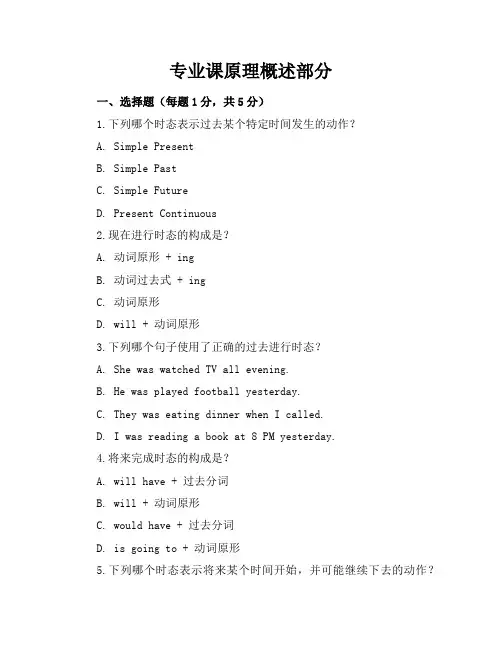
专业课原理概述部分一、选择题(每题1分,共5分)1.下列哪个时态表示过去某个特定时间发生的动作?A. Simple PresentB. Simple PastC. Simple FutureD. Present Continuous2.现在进行时态的构成是?A. 动词原形 + ingB. 动词过去式 + ingC. 动词原形D. will + 动词原形3.下列哪个句子使用了正确的过去进行时态?A. She was watched TV all evening.B. He was played football yesterday.C. They was eating dinner when I called.D. I was reading a book at 8 PM yesterday.4.将来完成时态的构成是?A. will have + 过去分词B. will + 动词原形C. would have + 过去分词D. is going to + 动词原形5.下列哪个时态表示将来某个时间开始,并可能继续下去的动作?A. Simple FutureB. Future ContinuousC. Future PerfectD. Present Continuous二、判断题(每题1分,共5分)1.现在进行时态不能用于描述正在进行的动作。
()2.过去进行时态的构成是was/were + 动词原形。
()3.将来完成时态可以用来表示在将来某个时间之前已经完成的动作。
()4.现在完成时态的构成是have/has + 过去分词。
()5.过去完成时态的构成是had + 过去分词。
()三、填空题(每题1分,共5分)1.我昨天晚上_____(read)了一本好书。
2.他们_____(go)去公园散步了。
3.当她到达学校时,雨_____(stop)了。
4.到明年这个时候,我_____(graduate)已经三年了。
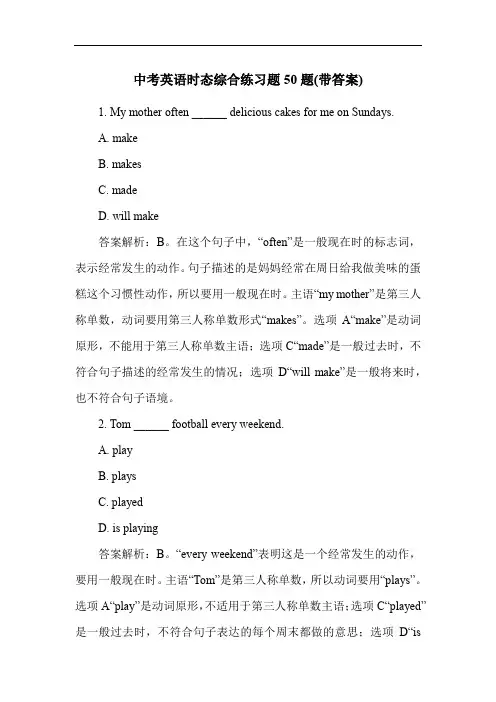
中考英语时态综合练习题50题(带答案)1. My mother often ______ delicious cakes for me on Sundays.A. makeB. makesC. madeD. will make答案解析:B。
在这个句子中,“often”是一般现在时的标志词,表示经常发生的动作。
句子描述的是妈妈经常在周日给我做美味的蛋糕这个习惯性动作,所以要用一般现在时。
主语“my mother”是第三人称单数,动词要用第三人称单数形式“makes”。
选项A“make”是动词原形,不能用于第三人称单数主语;选项C“made”是一般过去时,不符合句子描述的经常发生的情况;选项D“will make”是一般将来时,也不符合句子语境。
2. Tom ______ football every weekend.A. playB. playsC. playedD. is playing答案解析:B。
“every weekend”表明这是一个经常发生的动作,要用一般现在时。
主语“Tom”是第三人称单数,所以动词要用“plays”。
选项A“play”是动词原形,不适用于第三人称单数主语;选项C“played”是一般过去时,不符合句子表达的每个周末都做的意思;选项D“isplaying”是现在进行时,这里不是正在进行的动作。
3. The sun ______ in the east and sets in the west.A. riseB. risesC. roseD. has risen答案解析:B。
这是一个客观事实,太阳从东边升起西边落下,客观事实要用一般现在时。
主语“the sun”是第三人称单数,动词用“rises”。
选项A“rise”是动词原形;选项C“rose”是一般过去时;选项D“has risen”是现在完成时,都不符合客观事实用一般现在时的要求。
4. She ______ to school by bike every day.A. goB. goesC. wentD. will go答案解析:B。
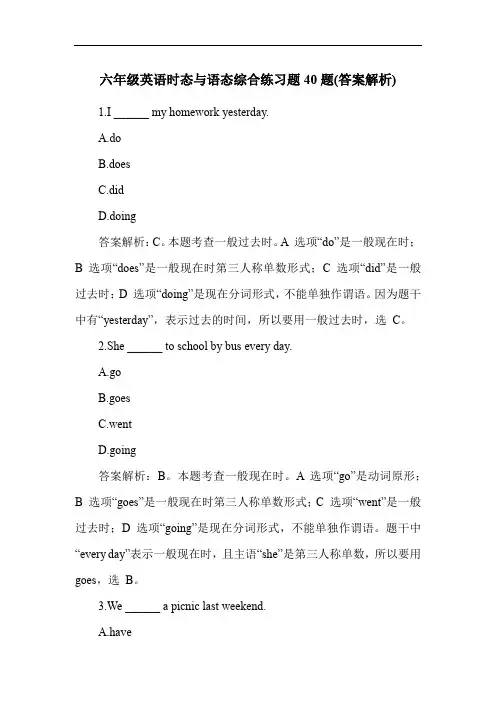
六年级英语时态与语态综合练习题40题(答案解析)1.I ______ my homework yesterday.A.doB.doesC.didD.doing答案解析:C。
本题考查一般过去时。
A 选项“do”是一般现在时;B 选项“does”是一般现在时第三人称单数形式;C 选项“did”是一般过去时;D 选项“doing”是现在分词形式,不能单独作谓语。
因为题干中有“yesterday”,表示过去的时间,所以要用一般过去时,选C。
2.She ______ to school by bus every day.A.goB.goesC.wentD.going答案解析:B。
本题考查一般现在时。
A 选项“go”是动词原形;B 选项“goes”是一般现在时第三人称单数形式;C 选项“went”是一般过去时;D 选项“going”是现在分词形式,不能单独作谓语。
题干中“every day”表示一般现在时,且主语“she”是第三人称单数,所以要用goes,选B。
3.We ______ a picnic last weekend.A.haveB.hasC.hadD.having答案解析:C。
本题考查一般过去时。
A 选项“have”是一般现在时;B 选项“has”是一般现在时第三人称单数形式;C 选项“had”是一般过去时;D 选项“having”是现在分词形式,不能单独作谓语。
因为题干中有“last weekend”,表示过去的时间,所以要用一般过去时,选C。
4.My mother ______ dinner for us every evening.A.cookB.cooksC.cookedD.cooking答案解析:B。
本题考查一般现在时。
A 选项“cook”是动词原形;B 选项“cooks”是一般现在时第三人称单数形式;C 选项“cooked”是一般过去时;D 选项“cooking”是现在分词形式,不能单独作谓语。

所有时态综合练习题在语言学习中,时态一直是一个重要的概念。
正确理解和使用时态是准确表达时间、条件、可能性等意思的关键。
为了帮助大家更好地理解和使用各种时态,我们提供了一份综合练习题。
一、现在简单时(Simple Present Tense)1、I ______ (watch) TV every night.2、They ______ (go) to school every morning.3、He ______ (write) a letter to his friend last week.二、现在进行时(Present Continuous Tense)1、I ______ (cook) dinner right now.2、They ______ (play) football at the moment.3、She ______ (call) you when she arrives.三、现在完成时(Present Perfect Tense)1、I ______ (finish) my homework already.2、They ______ (visit) the museum last weekend.3、He ______ (hear) from his brother in the last few days.四、过去简单时(Simple Past Tense)1、We ______ (watch) a movie last night.2、They ______ (go) to the park yesterday.3、She ______ (write) a poem yesterday.五、过去进行时(Past Continuous Tense)1、I ______ (be) in the library at that time yesterday.2、They ______ (play) in the park when it started to rain.3、She ______ (read) a book while we were talking.六、过去完成时(Past Perfect Tense)1、I ______ (read) the book before I went to bed.2、They ______ (finish) their homework when the teacher came in.3、She ______ (talk) to her friend before she came to the party. 以上是各种时态的练习题,希望可以帮助大家更好地理解和使用这些时态。
六年级英语各种时态标志词综合练习题30题1.I usually go to school by bike. But I _____ walk to school when it rains.A.sometimesB.oftenC.alwaysD.never答案:A。
本题中“usually”是一般现在时标志词,表示通常。
“sometimes”表示有时,符合下雨时偶尔步行去学校的语境。
“often”经常;“always”总是;“never”从不,均不符合下雨时的情况。
2.My mother _____ cooks breakfast for us every day.A.sometimesB.oftenC.alwaysD.never答案:C。
“every day”是一般现在时标志词。
“always”总是,表示妈妈每天都为我们做早餐。
“sometimes”有时;“often”经常;“never”从不,都不符合每天做早餐的语境。
3.We _____ have English classes on Monday and Wednesday.A.sometimesB.oftenC.always答案:B。
本题中“on Monday and Wednesday”表明在特定的日子,“often”经常符合语境。
“sometimes”有时;“always”总是;“never”从不,不太符合一周有两天上英语课的情况。
4.My father _____ reads newspapers in the evening.A.sometimesB.oftenC.alwaysD.never答案:B。
“in the evening”是一般现在时的时间标志,“often”经常,比较符合爸爸在晚上看报纸的习惯。
“sometimes”有时;“always”总是;“never”从不,不符合一般情况。
5.I _____ do my homework after school.A.sometimesB.oftenC.alwaysD.never答案:C。
初三英语时态综合练习题40题(带答案)1.She often ______ her homework after dinner.A.doB.doesC.doingD.did答案解析:B。
本题考查一般现在时,主语是she,第三人称单数,谓语动词要用does。
A 选项do 是原形,主语不是第一人称、第二人称或复数时不能用;C 选项doing 是现在分词,不能单独作谓语;D 选项did 是一般过去时,与题干中的often 不符。
2.He ______ to school by bike yesterday.A.goB.goesC.wentD.going答案解析:C。
本题考查一般过去时,yesterday 是明显的过去时间标志,谓语动词要用过去式went。
A 选项go 是原形;B 选项goes 是一般现在时第三人称单数形式;D 选项going 是现在分词,不能单独作谓语。
3.They ______ play football on Sundays.A.oftenB.oftensC.sometimesD.never答案解析:A。
本题考查一般现在时的频率副词用法。
B 选项oftens 拼写错误;C 选项sometimes 和D 选项never 也可以,但题干强调“经常”,often 更符合语境。
4.I ______ at home yesterday evening.A.amB.isC.wasD.were答案解析:C。
本题考查一般过去时,主语是I,be 动词要用was。
A 选项am 是一般现在时;B 选项is 也是一般现在时且主语是第三人称单数;D 选项were 主语是复数时用。
5.She ______ English very well.A.speakB.speaksC.spokeD.speaking答案解析:B。
本题考查一般现在时,主语是she,第三人称单数,谓语动词要用speaks。
A 选项speak 是原形;C 选项spoke 是一般过去时;D 选项speaking 是现在分词,不能单独作谓语。
九年级英语时态综合运用练习题60题1. I ______ my homework at school yesterday.A. forgotB. forgetC. leaveD. left答案:D。
本题考查一般过去时和动词的用法。
“forget”表示“忘记”,通常不与地点连用;“leave”有“遗留,落下”的意思,可与地点连用。
“yesterday”是过去的时间,所以要用过去式“left”。
A 选项“forgot”是“forget”的过去式,但不符合与地点连用的用法;B 选项“forget”是一般现在时,时态不对;C 选项“leave”是原形,时态错误。
2. We usually ______ to school by bike.A. goB. goesC. wentD. going答案:A。
本题考查一般现在时。
“usually”是一般现在时的标志词,主语“We”是复数,动词用原形“go”。
B 选项“goes”是第三人称单数形式;C 选项“went”是过去式;D 选项“going”是现在分词,不能单独作谓语。
3. The teacher ______ angry with me last week because I was late for class.A. isB. wasC. wereD. are答案:B。
本题考查一般过去时。
“last week”是过去的时间,主语“The teacher”是第三人称单数,所以用“was”。
A 选项“is”是一般现在时;C 选项“were”是复数过去式;D 选项“are”是一般现在时的复数形式。
4. My sister ______ her room every day.A. cleansB. cleanC. cleanedD. cleaning答案:A。
本题考查一般现在时。
“every day”是一般现在时的标志词,主语“My sister”是第三人称单数,动词用“cleans”。
中考英语时态综合练习题30题1.She often ________ her homework after school.A.doB.doesC.didD.will do答案:B。
本题考查一般现在时。
主语是she,第三人称单数,谓语动词要用does。
A 选项do 用于主语是非第三人称单数的一般现在时;C 选项did 是一般过去时;D 选项will do 是一般将来时。
2.We ________ a picnic last weekend.A.haveB.hadC.will haveD.are having答案:B。
本题考查一般过去时。
last weekend 是一般过去时的标志词。
A 选项have 是一般现在时;C 选项will have 是一般将来时;D 选项are having 是现在进行时。
3.Tom ________ to school by bike every day.A.goB.goesC.wentD.will go答案:B。
本题考查一般现在时。
every day 是一般现在时的标志词。
主语是Tom,第三人称单数,谓语动词要用goes。
A 选项go 用于主语是非第三人称单数的一般现在时;C 选项went 是一般过去时;D 选项will go 是一般将来时。
4.My mother ________ me a story when I was a child.A.tellsB.toldC.will tellD.is telling答案:B。
本题考查一般过去时。
when I was a child 是一般过去时的标志词。
A 选项tells 是一般现在时;C 选项will tell 是一般将来时;D 选项is telling 是现在进行时。
5.I ________ visit my grandparents tomorrow.A.willB.amC.wasD.have答案:A。
本题考查一般将来时。
时态练习题和答案1. 我昨天去了图书馆。
(一般过去时)- I went to the library yesterday.2. 他正在看书。
(现在进行时)- He is reading a book.3. 我们下周将去海滩。
(一般将来时)- We will go to the beach next week.4. 她经常在周末去购物。
(一般现在时)- She often goes shopping on weekends.5. 我还没有完成作业。
(现在完成时)- I have not finished my homework yet.6. 他们已经离开这个城市了。
(现在完成时)- They have already left the city.7. 我本应该早点起床的。
(过去完成时)- I should have woken up earlier.8. 他将会在明天回来。
(将来完成时)- He will have returned by tomorrow.9. 我正在学习英语。
(现在进行时)- I am learning English.10. 我去年这个时候正在度假。
(过去进行时)- I was on vacation this time last year. 答案1. went2. is reading3. will go4. often goes5. have not finished6. have already left7. should have woken up8. will have returned9. am learning10. was on vacation练习题11. 他们下周将参加一个会议。
(一般将来时)- They will attend a meeting next week.12. 我小时候经常去钓鱼。
(一般过去时)- I used to go fishing as a child.13. 我们明天会讨论这个问题。
初中英语时态练习(1)1.I will tell him as soon as he _____ backA. comeB. comesC. will comeD. came2. Mary _____ on shoes when she ____ them.A. tries…buysB. tries… buiesC. trys… buysD. trys… buies3. The girl often ______ cold when she ______.A. cathcs…danc esB. catches… dancesC. catchs…danceesD. catches… dancee4. _____ he ____ himself there? No, I don't think so.A. Do…enjoyB. Does… enjoiesC. Does… enjoysD. Does…enjoy5. _____ your teacher ____ from them very often? Certainly.A. Do…hearB. Does…hearC. Do… receiveD. receive6. _____ your mother _____ some cleaning on Sundays?A. Does…doesB. Do…doesC. Does…doD. Do… do7. _____ Tom _____to work hard to help his family ? Yes, he _____.A. Has… x…doesB. Has…x…doesC. Does…has…hasD. Does… have…does8. Which teacher _____ lessons to you every day ?A. does …givesB. does… giveC. do… giveD. gives9. Smith does not go fishing on weekdays, ____? _____ , he does.A. does he…NoB. does he…YesC. doesn't he…NoD. doesn't he…Yes10.Mr Black often _____ fishing on Sundays, _____ he ?A. goes…doesn'tB. goes…isn'tC. doesn't go…doesD. doesn't go…is11.He usually _____ TV on Sunday evening.A. watchB. watchesC. watchingD. is watching12. We'll go to play with snow if it ______ tomorrow.A. snowB. snowsC. will snowD. snowed13. Neither I nor he ______ French.A. speakB. doesn't speakC. speaksD. doesn't speak14. Nobody ______ how to run this machines.A . know B. have known C. knows D. is knowing15. The Young Pioneer _____ water for the old man every day.A. carryB. bringC. takesD. carries16. Some are ______ in the river and some are ______ games.A. swimming… playingB. swimming…plaiingC. swimming… I playingD. swimming…plaing17. Look ! The boy students are _____ football while the girls are _____ .A. playing… danceB. playing… dancingC. play… dancingD. play… dance18. He _____ to do his lessons at eight every evening.A. is beginningB. is beginningC. beginD. begins19. _____ he _____ on well with his friends this term ?A. Does…getsB. Does…getC. Is…gettingD. Is…geting20. Mr Smith _____ short stories, but he ____ a TV play these days.A. is writing…is writingB. is writing… writesC. writes… is writingD. writes… writes 参考答案:1—5 BABDB 6—10 CDDBA 11—15 BBCCD 16—20 CBDCC初中英语时态练习(2)21. I _____ to the cinema. I ______ there every Sunday.A. go…goB. am going… goC. go… am goingD. am going…am going22. Look, they______ a good time, ____ they ?A. have…doB. have…don'tC. are having…areD. are having… aren't23. You ______ about the future now, ______ you ?A. don't think…don'tB. aren't thinking… aren'tC. don't think… doD. aren't thinking… are24. She always ______ something whenever she ______.A .s tudied…played B. studied…plaiedC.. studied…plaiedD. studied… played25. He often _____ late in the forest. It _____ me very much.,A. stayed…worriedB. staied… worriedC. stayed…worryedD. staied… worried26. I ______that the boy _____ with no tears in his eyes.A. noticed… cryedB. noticed… criedC. noticed…criedD. noticed… cryed27. We _____the floor and _____ all the windows.A. mopped… cleannedB. moped… cleanedC. mopped…cleanedD. moped… cleaned28. When I _____ the Children's Palace, the children _____ with joy.A. visited… jumppedB. visited… jumpedC. visited… jumpedD. visited… jumpped29. ______ a sports meet last Sunday ? Yes , they ______.A. Did they have… didB. Did they have… hadC. Had they... had D. Had they (i)30. ____ you _____out for a walk after supper ? Yes, I ______.A. Did…went…wentB. Did… go… wentC. Did... went... did D. Did... go (i)31. _____ Jack _____ on with his work or ______ to have a rest?A. Did… went… stoppedB. Did… go… stopC. Did… went… stopD. Did… go… stopped32. You gave them a talk two days ago, _____you ? Yes, I ______.A. did… didB. did… gaveC. didn't… didD. didn't… gave33. ____ your brother _____ a letter to ? My father.A. Who… wroteB. What…wroteC. Who did…writeD. What did… write34. They _____ about the TV news then in the sitting-room. They often ____ such talksA. talked…hadB. talk…haveC. were talking…hadD. are talking…have35. He ______ some cooking at that time, so _____ me.A. did… heardB. did… didn't hearC. was doing… heardD. was doing… didn't hear36. " _____ you angry then?" "They_ too much noise.”A. Are…were makingB. Were…were makingC. Are…madeD. Were… made37. This time yesterday Jack _____ his, bike. He _____ TV.A. repaired… didn't watchB. was repairing… watchedC. repa ired… watchedD. was repairing… wasn't watching38. We _____ for Tom at ten last Sunday. He often kept us ______.A. were waiting… waitingB. were waiting… waitC. waited… waitingD. waited… wait39. When you _____ at the door, I _____ some washing.A. k nocked… didB. was knocking… didC. knocked… was doingD. knock… am doing40. The boy_____ English on the radio when I _____ his door.A. learned… was openingB. was learning… openedC. learned… openedD. is learning… open参考答案:21-25 BDDDA 26—30 BCBAD 31—35 BCCCD 36—40 BDACB初中英语时态练习(3)41. When they______ through the forest, a bear _____ at them.A. walked… was comingB. were walking… cameC. were talking… comesD. walk… is coming42. A young man _____ her while she _____ her work .A. watched… was finishingB. was watching… finishedC. watched… finishedD. was watching… was finishing43. While mother _____ some washing, I ______ a kite for Kack.A. did… madeB. was doing… madeC. was doing… was makingD. did… was ma king44. I _____ myself French from 7 to 9 yesterday morning. I _____ to work.A. was teaching… didn't goB. taught… didn't goC. was teaching… wentD. taught… went45. He _____ a model plane when I came to see him.A. makesB. is makingC. was makingD. made46. I ______ a letter at nine last night.A. is writingB. was writingC. wroteD. is writing47. The teacher_____ (give) us a history lesson when Tom walked into the classroom.A. gaveB. is givingC. was givenD. was giving48. There will be a football match in two days, that is _______.A. last SundayB. next SundayC. every SundayD. this Sunday49. We ______ class meeting this November.A. hadB. haveC. will haveD. are having50. He ______ in his garden every morning next year.A. will workB. worksC. workedD. is working51. Be careful. The train ______.A. will comeB.C. comesD. is coming52. Look at those clouds. It _____ soon, I'm afraid.A. is going to rainB. is rainingC. will rainD. won't rain53. The radio says it ______ the day after tomorrow.A. is going to snowB. is snowingC. will snowD. snows54. _____ he _____ some shopping tomorrow afternoon ?A. Will…doesB. is going to doC. is…doingD. Shall… do55. What day _____ it ______ tomorrow ? Wednesday.A. is… going to beB. will…beC. shall…beD. does…be56. The boy _______ sixteen years old next year.A. is going to beB. is growing to beC. will beD. is57. _____ you ____ me up at six, please ?A. Are…going to wakeB. Are…wakingC. Will…wakeD. Do…wake58. If he ______ to college, he _____ a lot more.A. will go…will learnB. will go…is going to learnC. is going… is going to learnD. goes… will learn59. When she _____ next time ,l ______ her everything.A. is going to come…shall tellB. will come…shall tellC. comes…will tellD. come…will tell60. What day ____ it ____ tomorrow ? It ____Tuesday.A. is…going to be… isB. will…be…willC. is…going to be…is goingD. will be…will be参考答案:41-45 BDCAC 46—50 BDDCA 51—55 DACBB 56—60 CCDCD初中英语时态练习(4)61. She _____that she _____ her best to help them the next term.A. says…will doB. said…will doC. said… would doD. says…would do62. People _____ that the Smiths _____ for a holiday next week.A. say… will goB. said… will goC. said… would goD. say…would go63. Nobody _____ us that he _____ even stricter with usA. tell…will beB. tells…would beC. told…will beD. told…would be64. Please _____ him that we _____ able to help him.A. tell…will beB. tells… would beC. told…will beD. told… would be65. Jack _____ that they _____ surprised to see it this Friday.A. know… would beB. knows… will beC. knew… would beD. knew… will be66. I _____to know if Mary_____ by train that afternoon.A. want… would goB. want… will goC. wanted… would goD. wanted… will go67. _____ he _____ that they _____ home tomorrow?A. Does… learn… would goB. Does… learn… will goC. Did… learn… would goD. Did… learn… will go68. We _____ that they _____ a sports meet tomorrow.A. learn… would haveB. have learned… would haveC. learn… will haveD. have learned… will have69. ____ you _____ that he _____ his lost son one day ?A. Do…think…will findB. Do…thought…would findC. Did…think…will findD. Did…thought…would find70. I _____ that you _____ good care of her that day.A. thought…will takeB. thought…would takeC. think… will take B. think… would take71. The visitors _____ where they _____ a short test.A. ask… would takeB. ask… will takeC. asked… would takeD. asked… can take72. John ____ sure that he ____ good at chemistry soon.A. be… will beB. is, would beC. was… will beD. was… would be73. She ____ ill so she ____ able to go skating the next day.A. is… won't beB. is… wouldn't beC. was… won' beD. was… wouldn't be74. He _____ the thief to the police when he _____ the man again.A. would take… would meetB. would take…metC. will take… will meetD. will take… meet75. Mother ____ me a new coat yesterday, I _____ it on. It fits me well.A. has made…have triedB. made…have triedC. has made…triedD. made…tried76. " He ____ to draw horses already ."" When ____he ?”. " Last year. "A. learned...has B. learned...did C. has learned...has D. has learned (i)77. Tom ____ up into the tree. Look, he _____ high up there !A. has got… isB. has climbed… wasC. got… wasD. climbed… is78. _____you _____ the text yet ? Yes, we _____ it two hours ago.A. Did…copy…didB. Have… copied…haveC. Have… copied… didD. Did …copy…had79. "Why she angry?" "Because he _____ at he just now.A. did… get, shoutedB. has…got…shoutedC. did… get… has shoutedD. has…got…has shouted80. _____ you ______ the film before ? Where ____ you _____ it ?A. Have… seen… did… seeB. Did…see…die…watchC. Have…seen… have… seenD. Did…see…have…seen参考答案:61-65 CADAB 66—70 CBDAB 71—75 CDDBB 76—80 DACBA初中英语时态练习(5)81. You _____ me waiting for two hours. I _____ for you since five.A. Kept…waitedB. have kept…waitedC. kept…have waitedD. have kept…have waite d82. Where _____John _____? To the library. He _____ there for an hour.A. has… been … has goneB. has…gone…has beenC. did… go… wentD. did…be…went83. _____ the baby still _____ ? No, it ______ crying.A. Has… cried… has stoppedB. Is…crying…stoppedC. Did… cry… stoppedD. Is…crying…has stopped84. I _____ the way. I ______ here for quite many years.A. knew... have lived B. knew (iv)C. know... have lived D. know (iv)85. _____ you ever _____America ? Yes, I have.A. Have… gone toB. Have… gone inC. Have… been toD. Have… been in86. My brother _______ college for over three years.A. has gone toB. has been toC. has been inD. has been for87. He _____ the Army by the end of 1992. He ____ in the army since then.A. joined…isB. has joined…has beenC. had joined…isD. has joined… has been88. By the time I _____ back they ____ up ten metres.A. came…have climbedB. came…had climbedC. come…have climbedD. had come…climbed89. Jack ____ over five lessons by seven o'clock. Then he____ a test.A. went…tookB. went…had takenC. had gone…tookD. had gone…had taken90. We _____ out by that time that he ____ a thief for a long time.A. had found…had beenB. had found…wasC. found…had beenD. found…was91. Before the new _____ him, he ____ to know about it.A. reaches… has gotB. reached…had gotC. reached… gotD. had reached…got92. I _____ him a second letter before I _____ from him.A. wrote… heardB. wrote… had heardC. had written… heardD. have written… hear93. We _____ in a good harvest because we ______ enough rain.A. didn't get… had hadB. got… had hadC. had got… had badD. got… hadn't had94. They ____for five hours when they ____ in New York.A. flew…arrivedB. had flown…had arrivedC. flew…had arrivedD. had flown…arrived95. She ____ that ____ it for two days by that day.A. says…has rainedB. says…had rainedC. said… had rainedD. said…rained96. John _____ there since the year before, so he ____ them.A. had worked…knewB. had worked….had knownC. worked…knewD. worked…had known'97. He _____ angry because he _____ for a long time.A. had got…had waitedB. got…waitedC. had got…waitedD. got…had waited98. Paper _____ first invented in China.A. isB. areC. wasD. were99. The Greens _____ China for five years.A. has been inB. have been inC. went toD. has gone to100.There _____ an eraser under the desk. Is it yours ?A. isB. hasC. wasD. had参考答案:81-85 DBDCC 86—90 DDBCA 91—95 BCBDC 96-100 ADCBA。
时态综合练习题
1.My mother will tell him as soon as he ____back.
e
B. will come
C. comes
D. came
2.___your father ____some cleaning on Saturdays?
A.Does, do
B. Does, does
C. Do, does,
D. Do,do
3.The Greens_____China for six years.
A.has been in
B. went to
C. have been in
D. has gone in
4.I ____him a second letter before I ____from him.
A.wrote
B. have written
C. write
D. had written
5.By the time I came back they ____up ten meters.
A.have climbed
B. had climbed
C. climbed
D. has climbed
6.----__you ever ____America?
---Yes, I have.
A.Have, gone to
B. Have, been to
C. Have, gone in
D. Have, been in
7.---____the baby still ____?
---No, it _____crying.
A.Has, cried, has topped
B. Did, cry, stopped
B.Is, crying, stopped D. Is, crying, has stopped
8.--He ___to draw horses already.
--When ____he?
--Last year.
A.has learned, did
B. has learned, has
C. learned, has
D. learned, did
9.The boy ___fifteen years old next year.
A.Is
B. will be
C. is going to be
D. is growing to be
10.Be careful. The train ____.
A.Will come
B. is coming
C. shall come
D. comes
11.Look at those clouds. It ____soon, I’m afraid.
A.Is raining
B. is going to rain
C. will rain
D. won’t rain
12.I ____a letter at nine last night.
A.Was writing
B. is writing
C. wrote
D. write
13.He ___a model plane when I came to see him.
A.Makes
B. is making
C. was making
D. made
14.---_____a sports meeting last Sunday?
---Yes, they_____.
A.Did they have, had
B.Did they have,did
B.Had they, had D. had they, did
15.My uncle said that he would telephone but I ____from him so far.
A. Haven’t heard
B. hadn’t heard
C. didn’t hear
D. heard。